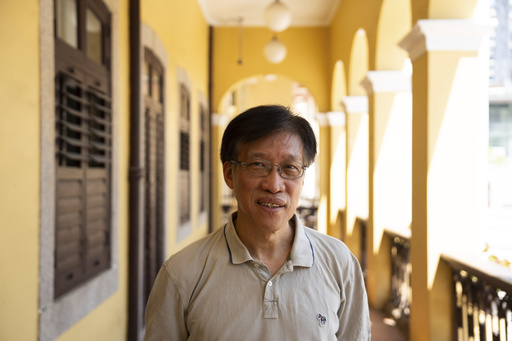In Macao, law enforcement has taken a man into custody on suspicion of violating the national security law by allegedly collaborating with external forces. Reports from local media indicate that the individual in question is believed to be the noteworthy pro-democracy figure, Au Kam San.
According to a statement issued by the police, the suspect, a 68-year-old Macao resident referred to by the surname Au, is accused of associating with an anti-China coalition outside the territory. He allegedly circulated misleading and inflammatory materials both online and overseas. The authorities detailed that the man’s activities included long-term connections with numerous anti-China organizations beyond Macao, through which he is claimed to have provided unreliable information for dissemination by their media bodies.
Police explained that such endeavors aimed to foment animosity toward China’s central authorities and Macao’s government among residents and to inaccurately influence people in other nations about the situation. It was further reported that these actions were potentially intended to derail Macao’s 2024 chief executive election and incite foreign hostility against the region.
Authorities detained Au at his residence as part of the ongoing investigation. Reports from media sources located in Hong Kong and Macao assert that Au, indeed, is the individual involved. According to All About Macao, this occurrence represents the first publicly acknowledged arrest under the national security law since its enactment in 2009 and updates in 2023.
Au’s wife appeared at the prosecutorial office on Thursday, where she was referred to as a “witness,” the article noted. Efforts to contact Au on Thursday afternoon were unsuccessful. Au, a one-time pro-democracy legislator, served in Macao’s legislature, predominantly controlled by Beijing allies, until 2021. Even after resigning, he continued to voice opposition to governmental actions and political developments within the region through platforms like Facebook and media interviews.
Since reverting to Chinese rule in 1999 from its previous state as a Portuguese colony, Macao has transformed from a gambling monopoly into the foremost international gaming destination. Unlike Hong Kong, a former British colony that shifted to Chinese governance in 1997, Macao’s pro-democracy movement has historically wielded less influence. It has also confronted comparatively fewer demonstrations challenging the government’s authority.
Significant political restrictions have been increasingly applied over recent years in response to expansive anti-government rallies in Hong Kong in 2019, which prompted Beijing to suppress nearly all forms of public dissent. Notable democratic events, such as commemorations of the 1989 Tiananmen Square crackdown, have been prohibited. Additionally, pro-democracy candidates were barred from participating in Macao’s 2021 legislative elections. Just recently, a centrist incumbent was disqualified from running in the current year’s legislative races.


